A big heart in the Big Apple
Honors graduate brings care, compassion to front lines in NYC hospital
Health and Behavior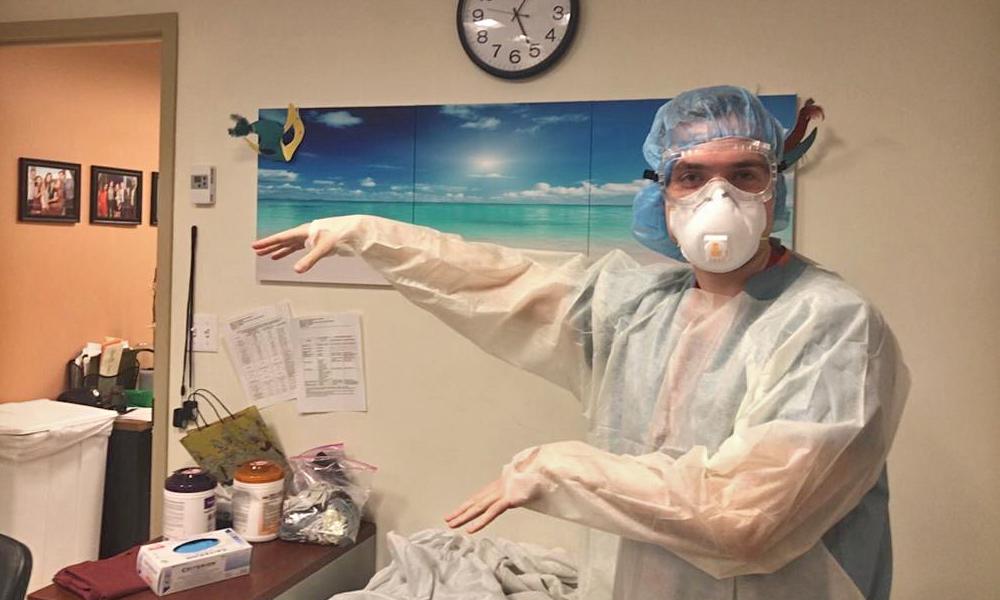
SUMMARY: Dr. David Killeen ('12) says JMU’s culture and the personalized support he received from professors, mentors, fellow students and alumni helped forge his professional path.
By Sarah Featherstone (’13, ’19M)
In June 2019, Dr. David Killeen (’12) was heading to New York City to start his first year of residency at New York-Presbyterian/Columbia University Medical Center.
Eight months later, COVID-19 hit and Killeen was thrown onto the front lines of treating patients in the U.S. epicenter of the pandemic.
“It was really quick,” Killeen said. “Within just a few weeks, we went from having no patients with coronavirus to, at one point, all but one of the 24 patients we had on our service had coronavirus.”
What began in the first week of March quickly escalated throughout the city as hospitals and staff prepared for the worst. Less than three weeks later, the number of patients testing positive for coronavirus skyrocketed, and cities across the U.S. went into lockdown.
“At one point, our emergency room, which normally has 30 beds, had 90 patients,” Killeen recalled.
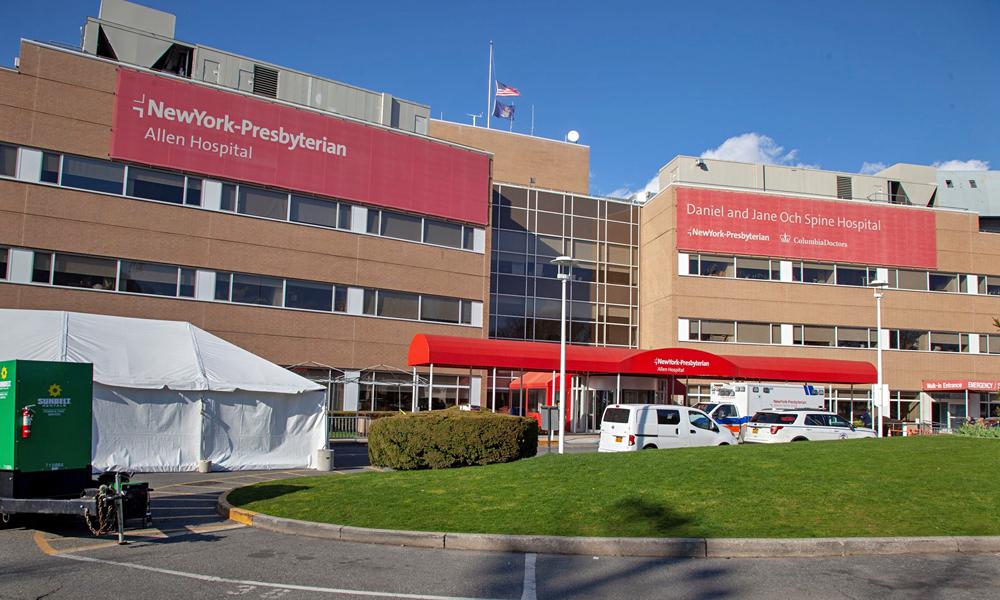
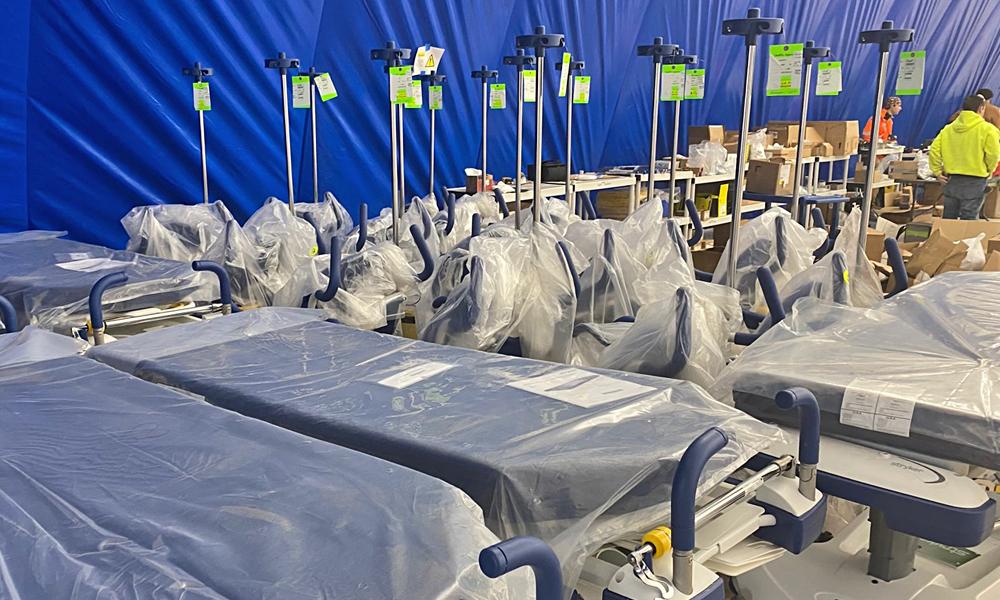
His small community hospital had to expand the number of ICU beds and turn other parts of the facility, including the psychiatry and post-op floors, into additional treatment rooms for coronavirus patients. It also utilized a large athletic field next to the hospital as treatment space for infected patients. Former military personnel and traveling nurses joined the hospital staff to help deal with the increasing number of cases, and established policies and procedures became obsolete as staff dealt with a shortage of personal protective equipment and limits on the number of visitors.
Killeen’s recollections from that time center around community, personalized care and devotion to service—personal values he said were nurtured during his time at JMU.
Fostering connections
Killeen entered JMU as a freshman in 2008 with a double major in biology and Spanish. He later picked up a minor in Latin American and Caribbean Studies and was admitted into the Honors Program, which is now a college.
A rigorous undergraduate schedule only seemed to complement his passions.
“I always grew up fascinated with languages … and learning about other cultures,” Killeen said, explaining his decision to double major. He also valued studying abroad, which was one of the deciding factors in choosing JMU. He knew of the many opportunities available, in part, because his older sister, Jessica Killeen (’07), had a rewarding experience in Argentina and Spain during her time at JMU. David’s decision was solidified when he received a scholarship to study biology as a Duke.
Killeen devoted himself to taking summer courses every year in order to fit in all of his schedule requirements.
“I had medicine on the radar, but I was also thinking of maybe becoming a teacher as well,” Killeen said. “I just always knew that I liked helping people.”
|
"It was during that time working on the ambulance that really solidified for me that I wanted to go to medical school and that this was something that I wanted to pursue." — Daivd Killeen ('12), on his time volunteering with the Harrisonburg Rescue Squad |
Killeen’s professors immediately noticed his passion.
Biology instructor Elizabeth Doyle taught Killeen during his sophomore year and then worked closer with him as a teaching assistant during his senior year.
“I’ve worked with a ton of teaching assistants over the years, and David was clearly one of the best,” Doyle remembered. “When you’re a TA, it’s a bit of a struggle because you’re serving two different populations. You’re there to help the lab instructor, but you’re also there to help the students. And David just had a really good knack of knowing how to balance those two.”
Killeen maintained an interest in teaching throughout his undergraduate career and followed that passion after graduation, spending two years teaching abroad in Spain and earning a master’s degree in education while he was there.
But he said a simple moment in the University Recreation Center changed the trajectory of his life.
During his first semester at JMU, Killeen approached a UREC employee, who was walking around with a fanny pack, to ask what she did at the center. The employee told him that students could take a for-credit course to work as an emergency medical technician, which Killeen ended up doing the following semester.
After taking that class, Killeen volunteered with the Harrisonburg Rescue Squad for two years, an experience that would lead him toward medical school.
“It was during that time working on the ambulance that really solidified for me that I wanted to go to medical school and that this was something that I wanted to pursue,” Killeen remembered. “It was a volunteer experience, but you could spend multiple nights out of the week sleeping at the rescue squad. And it just felt really natural to be able to talk to people, even in these moments of extreme stress for them. It didn’t really feel like work, so I knew it was something I wanted to do in the future.”
Killeen said the experience also showed him how well his knowledge of the Spanish language would serve him in the medical profession. “Being able to speak Spanish and be bilingual has done more for me than anything else,” he said.
|
"David was able to be passionately interested in cultures, languages, science and medicine, and didn't face a wall or a barrier or someone saying, 'Well, you've got to make a choice.'" — Sharon Babcock, pre-med advisor |
History professor Kristen McCleary, the Faculty Member in Residence on Killeen’s study abroad trip to Salamanca, Spain, said she could see his commitment early on.
“He always seemed to be able to take his interests and apply them to real, practical work,” McCleary said. “There was a real connection between his work and the community, and I think that was something that Harrisonburg had to offer, since we have a large immigrant population and a large demand for Spanish and medical support in this community.”
Biology professor Sharon Babcock, Killeen’s pre-med advisor, saw his commitment to the Spanish language as a unique quality that should be nurtured.
“It wasn’t just medicine for him; it was communities, cultures and medicine,” Babcock said. “And David was able to be passionately interested in cultures, languages, science and medicine, and didn’t face a wall or a barrier or someone saying, ‘Well, you’ve got to make a choice. How can you be genuinely committed if you’re still thinking about all these other things?’
“He’s just a wonderful example of what it means to be a JMU student,” Babcock added.
Killeen said JMU’s culture and the personalized support he received from professors, mentors, fellow students and alumni helped forge his professional path.
“I think, in general, there’s a lot of willingness from professors and other students to help you and to give you recommendations on what to do going forward and to talk about their experiences,” Killeen said, adding that JMU’s academic requirements, while rigorous, never made it feel like an intimidating place to learn.
Killeen also recalled the benefit of smaller class sizes, which he was guaranteed as an Honors student. And he appreciated the unique Honors seminar courses, which provided opportunities to discuss topics that were outside of his major.
“The Honors seminars offered me the opportunity, in a small-group setting, to discuss topics and subjects that were not offered in traditional classes, [and] I looked forward to the intellectually stimulating sessions,” Killeen said.
While that one defining moment in UREC changed Killeen’s trajectory, he said it was the array of opportunities and experiences he had at JMU that made his time as a Duke so rewarding.
“It’s the accumulation of all these small moments of support,” Killeen explained. “I don’t think people realize how much it helps you grow as a person, and it all sort of led me to where I am right now.”
On the front lines
In 2015, Killeen entered medical school at Virginia Commonwealth University in a track for students interested in family medicine.
Killeen, whose mother is a family physician, said he always thought of a doctor as the first point of contact for a patient. While working at a community health center prior to medical school, he noticed how patients were sent to various departments depending on their ailments.
“A light bulb clicked for me that I could be the physician who’s taking care of this whole thing,” Killeen said. “For me, that’s always how I thought [being a doctor] would be, that it’s not only taking care of the patient in front of you, but thinking about the context of their family and the community that they're in.”
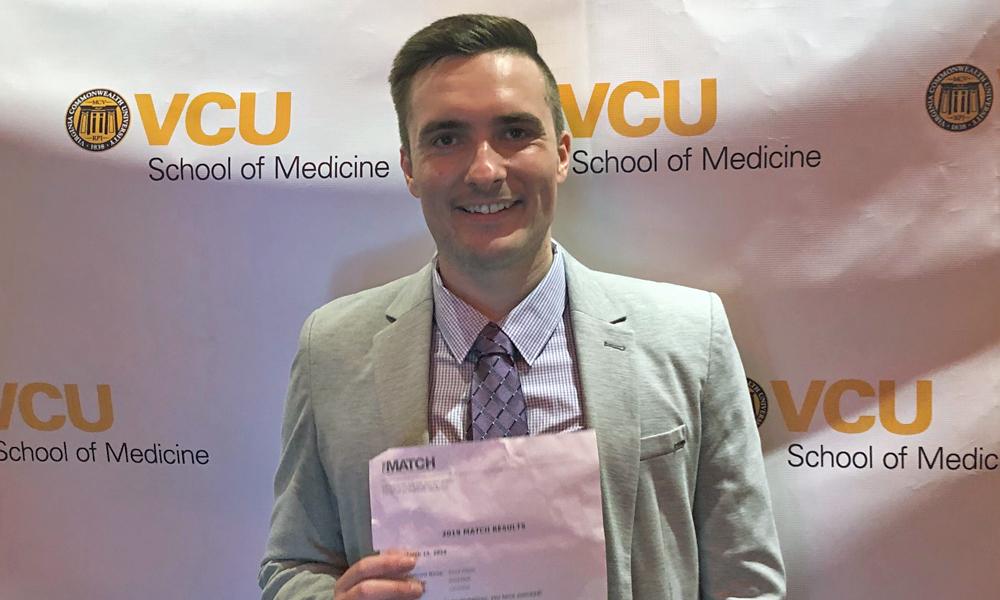
That lens has proven important during the pandemic. As a family medicine resident at New York Presbyterian/Columbia University Medical Center, about half of Killeen’s patients speak Spanish, so his focus on language and cultures has proven important. He said he uses his second language every day and relies on previous teaching experiences to aid him in his work.
“I feel really fortunate that every day I get to use those skills to not only teach patients about what’s going on with them, but to really teach them how to empower themselves and take control of their health,” he said. “That’s something that’s really fun for me, especially when they teach me back things that I’ve told them or things they remember from previous visits.
“So, luckily, I got to hold on to that part of teaching that I enjoyed,” he added.
While Killeen has continued to work with patients through telemedicine procedures, including video calls, his in-hospital residency has drastically changed since the pandemic. Normally, residents have different rotations so they can experience multiple departments, but all of those experiences were canceled as the hospital turned its full attention to treating coronavirus patients.
Killeen says what started as a normal year in residency quickly shifted, with many of the established procedures being disrupted as doctors attempted to treat a novel virus that was making patients very sick, very fast.
Killeen recalled having patients on the highest amount of oxygen possible, but it still not being enough. He said he’s lost more patients during this pandemic than he did during the entire first eight months of residency.
Many hospitals, including Killeen’s, also restrict visitors, meaning that families aren’t allowed to visit or say a final goodbye to their loved ones. In an effort to mediate these difficult experiences, Killeen would FaceTime with a dying patient’s family, holding the phone as the family members said their final words.
He said he realized how much these experiences have impacted him when he starts to think about another spike or a second wave coming in the fall and clinging to hope that he won’t have to go through it again.
Killeen has been documenting these experiences in detail so that he can revisit them, but not have to carry them on his shoulders every day. “I think that has been a really helpful thing for me,” he said. “And I would recommend it to other people [who] have had to work in these situations.”
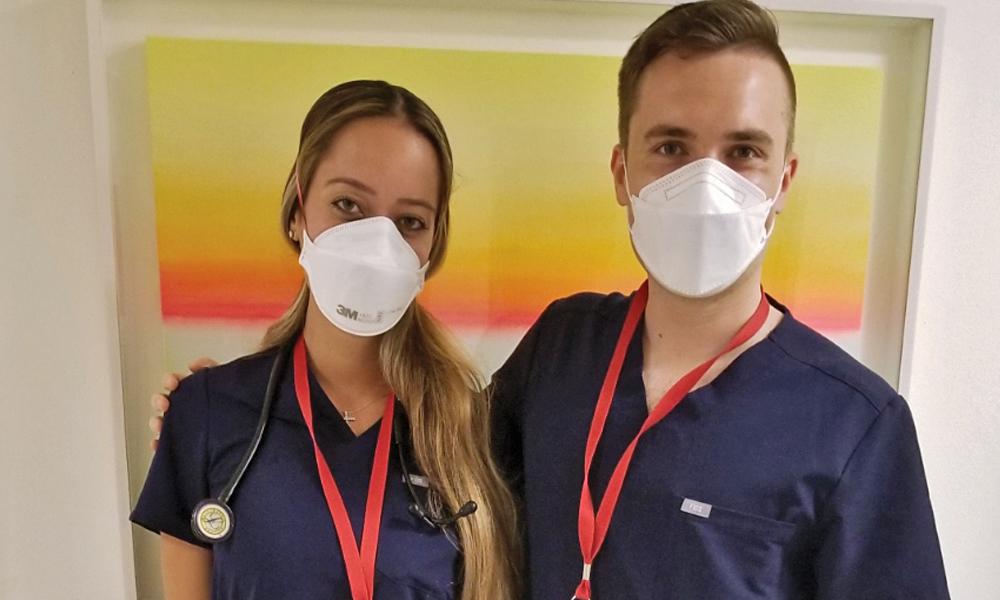
While treating patients during a pandemic is traumatic, Killeen said the experience has reinforced the importance of building relationships with them.
“It’s definitely helped me realize how important it is, especially from the family medicine side, to build a relationship with patients and their families over a long period of time so that when something like this does happen and there’s an abrupt change in health, you already have a relationship established with the patient and the family,” Killeen explained. He added that checking in with patients who were stuck at home in quarantine, especially those in their older age, also demonstrated the effects of authentic medical care.
“I think the whole experience has reinforced how important that is for people to have a primary care physician and to have a physician who knows who they are and cares about them,” Killeen said.
Jessica Killeen knows how much her brother truly cares about his patients because she’s seen his devotion to helping others from an early age.
“One thing about David is that he’s always been very caring, and I think that shines through with his medicine,” she said. “I’m not surprised he’s chosen a field where his job is to take care of others. That’s where he exceeds.”
Looking toward the future
Prior to beginning his residency, Killeen visited JMU pre-med students to discuss applying to medical school and being a medical student. During the presentation, Killeen said he discussed the importance of hands-on experience to ensure being a doctor is something they are truly passionate about. This is especially more important now as medical professionals are faced with a new reality and an uncertain future.
“It’s not an easy job and at times there’s not a lot of thanks for what you’re doing,” Killeen said, adding that during the pandemic, he was working 100 hours per week.
“The only thing that was getting me up in the morning and helping me through these really long days was the fact that this was something I’m really passionate about—giving people the care they need,” Killeen explained. “So, I think that’s just one thing that I would reiterate is more important now, to really think about what your motivations are for going into this and then trying to find ... within medicine, what really brings your passion out and trying to pursue that.”
Jessica Killeen, deputy counsel to Virginia Gov. Ralph Northam, believes that JMU’s culture aids those who desire to work for the greater good.
“I really do think [JMU] makes you humble, hardworking, social and kind,” she said.
Killeen said that despite the difficulties ahead, he holds on to the little things that can brighten someone’s day.
“One thing that has been important in this whole crisis, especially in the hospital, is that there are little things you can do during the day that can make someone else’s day a little bit nicer,” Killeen said, reflecting on small gestures he has done to help dying patients feel more comfortable.
“I think [the little things], like trying to do something extra for your neighbor or when you’re at work, are even more important now where a lot of people feel isolated,” he added. “I think that does go a long way and that’s something that I learned at JMU.”
Killeen said things are beginning to slow down in NYC as his clinic reopened and began seeing patients for regular appointments. But his devotion to service remains the same, something his sister believes will “change the world.”
“I do think my brother’s a really special person, and I’m so excited for his career and all the people that he’s going to be able to get to help,” Jessica Killeen said. “I know he’s going to have a big impact on people’s lives and medicine and people he meets, and I can’t wait to see in 10, 20, 30 years from now, the impact that he could have on the health care system.”
“So I’m really excited for him, to see what he does with his career, and I’ll be there cheering him on every step of the way.”

